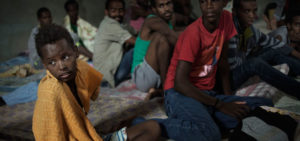Disclaimer: This article is more than 7 years old, and may not include the most up-to-date information or statistics. Please verify information with more recent sources as needed, and if you have any questions contact our Press Office.
Aidan McQuade, examines the risks of trafficking for them and questions whether Britain is prepared to tackle child trafficking.

“Over 10,000 went missing over two years.”
The ongoing refugee crisis in the Mediterranean has been keeping the world’s attention for a while now, particularly because of the high number of unaccompanied children who arrive to Europe in search of a better life. In May Eurostat reported that almost 90,000 unaccompanied children were registered as asylum seekers in 2015 throughout Europe, whilst Europol reported earlier that over 10,000 went missing over two years.
Anti-Slavery International has been concerned about this situation, not least because of the risks of trafficking and forced labour that child refugees face. These increased risks have been highlighted by Anti-Slavery and others for some time, and, more recently, there have been a number of media reports about children being exploited, particularly for sex.
Other reports point to risks of children being trafficked into forced labour in agriculture, domestic servitude, as well as forced criminality and forced begging.
What’s the truth?
Of course, of those thousands of children who have gone missing not all will have been trafficked. Some will have got to their final destination, and may be with friends or extended family. Some also will be close to being adults and capable of establishing new lives for themselves in various places in Europe in a safe manner, without necessarily being exploited.
However, the scale of the refugee flows, the unsatisfactory response by Europe to the crisis, and the desperate conditions that many children will find themselves in when they finally get to Europe means that the likelihood of trafficking is sharply increased.
Anti-Slavery are monitoring the situation closely and are calling for relevant policies to be put in place across Europe to tackle child trafficking, not only in the face of the refugee crisis, but at all times.
Is Britain ready?
It is worth looking at how the UK deals with child trafficking, and how it is prepared to face the risks the refugee crisis poses to children.
Although there has been no evidence thus far linking child trafficking in the UK to the refugee crisis, there have been nearly a thousand children referred to authorities as potentially trafficked last year. Britain shouldn’t need the refugee crisis to find motivation to take child trafficking seriously.
Some problems have been known for years. There has been evidence of relevant support not being provided to some children who have been trafficked, children from outside of the European Union have been known to not be identified as victims of trafficking despite substantial evidence, and many children have gone missing from the care of authorities.
Some of these problems have been addressed to an extent by the Modern Slavery Act, for example by introducing legal advocates to provide them with greater specialised protection and prevent their re-trafficking. However, the scheme has still not been rolled out properly, and much remains to be done.
Additionally, the UK is widely perceived across Europe as failing to bear its fair share in the European response to the crisis, especially in relation to children.
At the end of July 2016 the UK House of Lords published a report criticising the UK for failing to take in its fair share of unaccompanied children.
The committee chair Baroness Prashar said, “We found that these children… are seen as ‘somebody else’s problem’ and the conditions they live in were described to us as deplorable and squalid…”
The UK’s failure to accept refugee children threatens the much repeated ambitions of Prime Ministers Cameron and May for the UK to be a world leader in the struggle against slavery.
Without effective political leadership on the refugee crisis, particularly without safe migration options and legal resettlement for child refugees, there will continue to be marked increases in the risks of trafficking for those children who have managed to survive their perilous journeys.
What is Anti-Slavery International calling for:
- Proper resourcing of a system of guardians for unaccompanied refugee and migrant children.
- Proper investment in systems of human rights protections, in particular for children in the refugee camps of the Mediterranean.
- Increased awareness amongst police and immigration officials of the rights of refugees and victims of trafficking and the responsibilities of public officials towards them.
- Implementing of comprehensive anti-trafficking policies across Europe, with child protection at their heart.
- A coordinated response within the EU to establish safe migration routes for refugees, particularly for children, to places where they can obtain safe refuge and adults can find decent work.
This article first appeared in our Reporter magazine. Donate or become a member to receive our Reporter.


